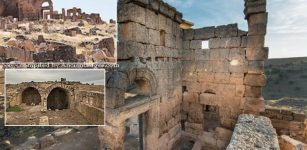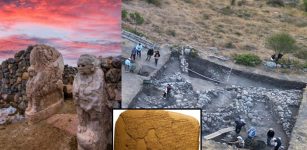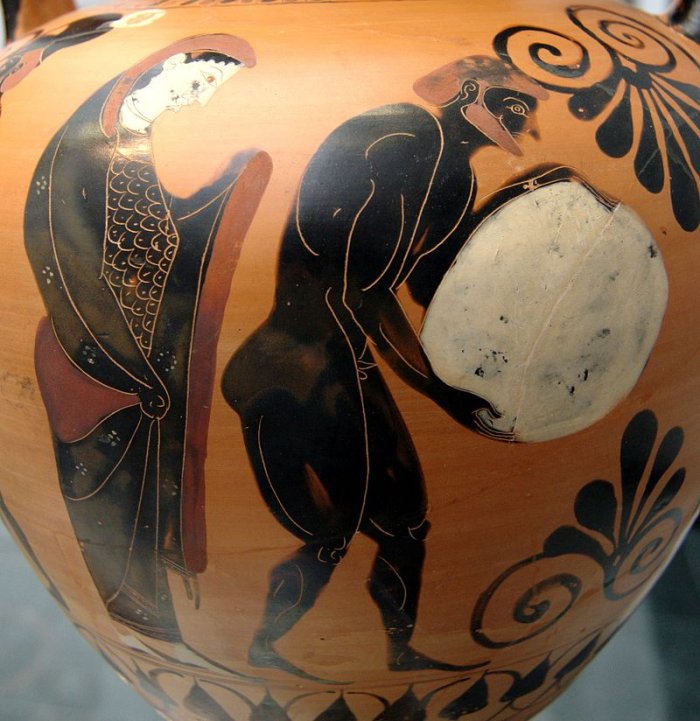Why Did God Zeus Give King Sisyphus An Eternal Punishment?
Ellen Lloyd - AncientPages.com - Being judged by the Greek gods was horrible, but receiving an eternal punishment was the worst that could happen.
Sisyphus tried to escape his fate, but Zeus had his eyes on him, and the founder and first king of Ephyra (Corinth) had to pay the price for his evil nature and misbehavior.
What horrible deeds did King Sisyphus commit? How could he upset the mighty god Zeus so much that he was condemned to hard labor for an eternity?
God Zeus was a harsh punisher, and he didn’t hesitate to judge even those he cared much about. For example, King Tantalus who was the son of Zeus was an arrogant and evil individual who violated divine laws. As Zeus’ son, he was expected to demonstrate appropriate behavior but he could not, or perhaps he didn’t want to. Zeus gave his son a penalty that never ceased and punished Tantalus by sending him to Tartarus, the land of the dead.
Prometheus didn’t escape Zeus’s fury either. He wanted to give humans the gift of fire, but Zeus disapproved. Prometheus’ actions led to him being severely punished by the gods for multiple transgressions. He was chained to the rocks of the Caucasus, where he had to spend thousands of years.
King Sisyphus Was An Evil Man
Through his seduction of Anticleia, King Sisyphus is sometimes referred to as the true father of Odysseus, a legendary Greek king of Ithaca and the hero of Homer's epic poem the Odyssey.
According to Greek myths, King Sisyphus was an evil ruler who enjoyed killing people and was extremely greedy for wealth. He has been credited with the founding of the Isthmian Games, an ancient sport and music festival in Greece celebrated in honor of sea god Poseidon.
God Zeus’ Eternal Punishment Of King Sisyphus - Canvas by Antonio Zanchi (1660-1665) Credit: Public Domain
Sisyphus committed several crimes against gods and mortals. He killed, raped, stole, and was hated by many.
The fact that was both cunning and intelligent worked for and against him. Zeus was furious when King Sisyphus killed guests and travelers because this was a clear violation of xenia, the Greek concept of hospitality and generosity that should be shown to people who are far away from home.
King Sisyphus also had conflicts with his brother Salmoneus, who took the throne of Thessaly from him. Eager to learn how he could kill his brother, Sisyphus consulted the Oracle of Delphi.
Family issues became worse than ever when Sisyphus seduced Tyro, Salmoneus's daughter. This was no love affair, but rather part of the wicked king’s murder plot. Sisyphus’ goal was to kill his brother. When Tyro learned the truth about how she had been used to dethroning her father, she killed the children.
Sisyphus Betrayed God Zeus’ Secret
“Near Sicyon, there is a river that runs from the mountains to the blue waters of the Corinthian Gulf. The god of this river was named Asopus and he had a beautiful daughter named Aegina. Zeus fell in love with her and came to her one night in the form of a flame.
Then he carried her to an island near Athens where she gave birth to a son named Aeacus. Asopus searched everywhere for his daughter. As of last he came to Sisyphus, king of Corinth, who said that it was Zeus who had stolen Aegina away.
In thanks, Asopus created a stream of fresh water for Sisyphus on the top of a dry fortress overlooking his city. The river god then set out to take back his daughter, but Zeus wounded him with a thunderbolt and he was forced to return home without Aegina. Zeus punished Sisyphus for betraying his secret. He sent Sisyphus to Hades to forever roll a boulder up a hill, only to have it roll down again when it reached the top.“ 1
It is because of this myth we define Sisyphean tasks as endless and impossible to complete.
King Sisyphus Attempt To Cheat Death
King Sisyphus didn’t want to die, and he tried to cheat death. He used trickery to escape from Hades. When Thanatos, the personification of death arrives to escort him to Hades, King Sisyphus uses the opportunity to fool everyone.
“He sees Thanatos coming from afar and lies in wait for him, with one of those traps that are his specialty. Thanatos walks right into it: Sisyphus hurls himself upon him, ties him up with sturdy ropes, and conceals him in a closet somewhere in his immense palace.
As with the myth of Asclepius, the world now begins to go off the rails. With Thanatos imprisoned, no one can die. Hades, wealthiest of all the gods, stops accumulating wealth: he no longer has his quota of the dead, and if Zeus does not do something to restore order, the planet earth will become so cluttered as to make life impossible.
It is Ares, god of war, who decides to act. You may guess why: If nobody dies any longer, what is the point of war? Ares finds Thanatos, frees him, and delivers into his hands the unfortunate Sisyphus, who is now well and truly forced to descend to Hades . . . at which point you might think that the game is up for Sisyphus. But wrongly so: he has one more trick up his sleeve.
Before dying and forsaking his palace for the realm of Hades, Sisyphus makes a very strange request of his wife: “Above all, please grant this wish, and do not accord me any burial or such funeral honors as every good wife is obliged to perform on the day her husband dies. . . . Do not ask why, I will explain later.”
And Merope, his charming wife, does as her husband says: she does not watch over his corpse; she carries out none of the rites that would normally be performed.
So that, as soon as he arrives in the depths of the underworld, Sisyphus makes straight for Hades himself and complains bitterly about having such a bad wife, and no burial rites.
Profoundly shocked by such a lack of propriety, Hades allows Sisyphus to return home to the upper world, to chastise his unworthy spouse as he sees fit, on condition of course that he promises to come back directly afterward.
As you may imagine, Sisyphus goes home and promptly forgets his promise about returning to the underworld. On the contrary, he gives grateful thanks to his wife, proceeds to give her numerous children over the years, and ends his days dying quietly in old age.
Only then is he obliged to return underground, where he is forced to interminably roll his great boulder: a torment that Hades imposes so as not to be duped a second time.
Persephone supervising Sisyphus in the Underworld. Attica black-figure amphora (vase), c.?530 BC, Staatliche Antikensammlungen. Credit: Public Domain
As for the meaning of the torture itself, it relates directly (as always) to the crime. For mortals, life is a perpetual beginning, not an open road without end. And whoever tries to push back these limits—as dispensed by the cosmic order—will learn to his cost that, once arrived at its term, the process must begin again from zero: life is a state of constant renewal. In other words, and to restate the lesson of Odysseus, no individual can escape the essential finiteness of his human condition.“ 2
Many myths remain a vast and valuable store of wisdom. If we read these stories carefully and contemplate, then they can easily be treated as lessons offering guidance in daily life. Myths are powerful because they can give answers to fundamental questions concerning morality, guilt, crime, and how to find one's place in the world.
The story of King Sisyphus illustrates what can happen when you try to cheat and escape the inevitable, which in this case is death.
Updated on February 7, 2022
Written by Ellen Lloyd – AncientPages.com
Copyright © AncientPages.com All rights reserved. This material may not be published, broadcast, rewritten or redistributed in whole or part without the express written permission of AncientPages.com
Expand for references- Philip Freeman – Heroes Of Olympus
- Luc Ferry - The Wisdom of the Myths: How Greek Mythology Can Change Your Life
More From Ancient Pages
-
 Huangluo: Long-Hair Village Where Women Don’t Cut Their Hair – A 2,000-Year-Old Tradition Of The Yao People
Ancient Traditions And Customs | Jun 18, 2017
Huangluo: Long-Hair Village Where Women Don’t Cut Their Hair – A 2,000-Year-Old Tradition Of The Yao People
Ancient Traditions And Customs | Jun 18, 2017 -
 On This Day In History: Battle Of Dettingen – English Armies Were Victorious Over The French – On June 27, 1743
News | Jun 27, 2016
On This Day In History: Battle Of Dettingen – English Armies Were Victorious Over The French – On June 27, 1743
News | Jun 27, 2016 -
 Sanctuary Of God Mithra And His Mysterious Religion Unearthed In Corsica
Archaeology | Mar 2, 2017
Sanctuary Of God Mithra And His Mysterious Religion Unearthed In Corsica
Archaeology | Mar 2, 2017 -
 Who Was King Menes? Mystery Of This Legendary Ruler May Go Back 20,000 Years
Civilizations | May 1, 2017
Who Was King Menes? Mystery Of This Legendary Ruler May Go Back 20,000 Years
Civilizations | May 1, 2017 -
 4,000-Year-Old Tomb Altóir Na Gréine Rediscovered By Folklorist In County Kerry, Ireland
Archaeology | Jan 24, 2024
4,000-Year-Old Tomb Altóir Na Gréine Rediscovered By Folklorist In County Kerry, Ireland
Archaeology | Jan 24, 2024 -
 The Writing Ball: A Great Invention In 1870
Ancient History Facts | Jun 30, 2016
The Writing Ball: A Great Invention In 1870
Ancient History Facts | Jun 30, 2016 -
 Face Of Egyptian Man Who Lived 35,000 Years Ago Reconstructed
Archaeology | Apr 7, 2023
Face Of Egyptian Man Who Lived 35,000 Years Ago Reconstructed
Archaeology | Apr 7, 2023 -
 Demon Oni: Cruel Harbinger Of Disease And Misfortune In Japanese Folklore
Featured Stories | Dec 2, 2019
Demon Oni: Cruel Harbinger Of Disease And Misfortune In Japanese Folklore
Featured Stories | Dec 2, 2019 -
 Ancient Maya Reservoirs Contained Toxic Pollution – New Study
Archaeology | Jun 27, 2020
Ancient Maya Reservoirs Contained Toxic Pollution – New Study
Archaeology | Jun 27, 2020 -
 Beehive’ Adobe Houses Of Ancient City Of Harran, Upper Mesopotamia
Civilizations | Dec 28, 2018
Beehive’ Adobe Houses Of Ancient City Of Harran, Upper Mesopotamia
Civilizations | Dec 28, 2018 -
 Unexpected Discovery Of Huge Iron Age Roundhouse At Dinas Dinlle, Wales
Archaeology | Sep 9, 2019
Unexpected Discovery Of Huge Iron Age Roundhouse At Dinas Dinlle, Wales
Archaeology | Sep 9, 2019 -
 Suprising Discovery Of A Well-Preserved Ancient Roman Road In London, UK
Archaeology | Nov 19, 2024
Suprising Discovery Of A Well-Preserved Ancient Roman Road In London, UK
Archaeology | Nov 19, 2024 -
 Rare Ancient Underwater Maya Ruins And Salt Kitchens Discovered
Archaeology | Oct 13, 2022
Rare Ancient Underwater Maya Ruins And Salt Kitchens Discovered
Archaeology | Oct 13, 2022 -
 1,800-Year-Old Entrance To Turkey’s Zerzevan Castle Found Among The Ruins
Archaeology | Aug 15, 2020
1,800-Year-Old Entrance To Turkey’s Zerzevan Castle Found Among The Ruins
Archaeology | Aug 15, 2020 -
 Cuneiform Tablet With New Indo-European Language Discovered In The Capital Of The Hittites
Archaeology | Sep 21, 2023
Cuneiform Tablet With New Indo-European Language Discovered In The Capital Of The Hittites
Archaeology | Sep 21, 2023 -
 Nicolas Bourbaki: The Greatest Mathematician Who Never Was
Featured Stories | Dec 24, 2019
Nicolas Bourbaki: The Greatest Mathematician Who Never Was
Featured Stories | Dec 24, 2019 -
 Underwater Robot Investigates Edo Period Decorative Tiles Off Shizuoka, Japan
Archaeology | Dec 7, 2015
Underwater Robot Investigates Edo Period Decorative Tiles Off Shizuoka, Japan
Archaeology | Dec 7, 2015 -
 Extraordinary Ancient Roman Ceremonial Chariot Discovered In Pompeii – It’s Still Almost Intact
Archaeology | Mar 1, 2021
Extraordinary Ancient Roman Ceremonial Chariot Discovered In Pompeii – It’s Still Almost Intact
Archaeology | Mar 1, 2021 -
 Missing Lines From Epic Of Gilgamesh Shed New Light On Humbaba
Artifacts | Oct 9, 2015
Missing Lines From Epic Of Gilgamesh Shed New Light On Humbaba
Artifacts | Oct 9, 2015 -
 Beautiful Legend Of Giant Olentzero Who Brings Christmas Presents To Basque Children
Christmas Traditions | Dec 19, 2024
Beautiful Legend Of Giant Olentzero Who Brings Christmas Presents To Basque Children
Christmas Traditions | Dec 19, 2024



